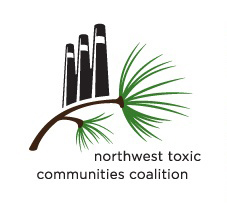A version of this story was originally published in the Spring 2013 UW SRP eBulletin.
 The Northwest Toxic Communities Coalition (NWTCC) is composed of independent community organizations in Alaska, Idaho, Oregon and Washington working on local hazardous waste and environmental issues. The members communicate regularly and meet face to face at annual Coalition Summits that began in 2005. (Summits are supported in part by the UW-SRP Research Translation / Community Engagement Core). Just over a year ago, the Coalition worked with Region 10 EPA and the UW SRP program to develop a regional outdoor air workshop called the Northwest Regional Outdoor Air Quality Workshop for Communities.
The Northwest Toxic Communities Coalition (NWTCC) is composed of independent community organizations in Alaska, Idaho, Oregon and Washington working on local hazardous waste and environmental issues. The members communicate regularly and meet face to face at annual Coalition Summits that began in 2005. (Summits are supported in part by the UW-SRP Research Translation / Community Engagement Core). Just over a year ago, the Coalition worked with Region 10 EPA and the UW SRP program to develop a regional outdoor air workshop called the Northwest Regional Outdoor Air Quality Workshop for Communities.
Northwest Toxic Communities Coalition members have a strong knowledge base rooted in decades of work and experiences. They are well versed in federal environmental regulations and laws. Their interests are best served with focused discussions that are timely and relevant to their needs. To this end, the Coalition asked the UW-SRP Core to assist them in launching an in-depth series of webinars for the membership.
The first webinar held in December, 2012 focused on the environmental laws of the Clean Water Act and ‘Superfund’ designated sites (Superfund is the common term associated with the Comprehensive Environmental Response, Compensation, and Liability Act). The invited speaker was law professor and practicing environmental lawyer, Daniel Mensher from Lewis and Clark University in Portland, Oregon. The second webinar was held in April 2013 and explored pro se Citizen Appeals, Motions & Declarations. The presenter was attorney Claire Tomry with the Seattle law firm Smith and Lowney, PLLC.
Webinar participants are surveyed to assess the perceived value of the event, its educational value and relevance to participants’ needs and interests. Response to the webinars has been highly positive, with members responding that they gained a more detailed knowledge of enforcement powers of the Clean Water Act and achieved a greater understanding about citizens’ ability to pursue environmental issues. To learn more about the resources, activities, and events of Northwest Toxic Communities Coalition, refer to their website above.

